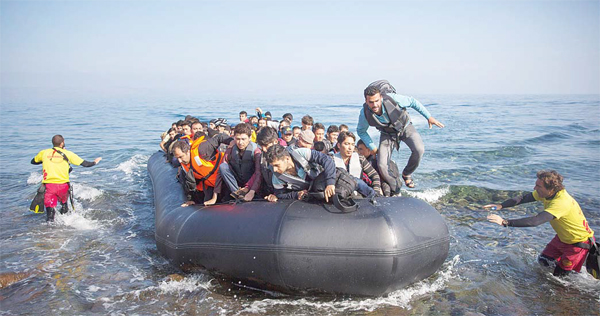20/10/2015
20/10/2015
 Migrants and refugees arrive on a dinghy from the Turkish coast to the northeastern Greek island of Lesbos on Oct 19. More than 600,000 people, mostly Syrians, have reached Europe since the beginning of this year. (AP)
Migrants and refugees arrive on a dinghy from the Turkish coast to the northeastern Greek island of Lesbos on Oct 19. More than 600,000 people, mostly Syrians, have reached Europe since the beginning of this year. (AP)BERKASOVO, Serbia/LJUBLJANA, Oct 19, (Agencies): The Balkans struggled with a growing backlog of migrants on Monday after Hungary sealed its southern border and Slovenia tried to impose a limit, leaving thousands stranded on cold, wet borders where tempers frayed. Having declared it would accept only 2,500 per day, Slovenia said 5,000 had arrived from Croatia on Monday, with another 1,200 on their way by train. “Croatia is ignoring our pleas, our plans,” Bostjan Sefic, state secretary at Slovenia’s interior ministry, told a news conference, saying the army would be called in to help if such a rate continued.
Attempts by Slovenia to ration the flow since Hungary sealed its border with Croatia at midnight on Friday has triggered a knock-on effect through the Balkans; Croatia began holding back new arrivals and Serbia said it may do the same on its border with Macedonia. More than 10,000 were stranded in Serbia, the United Nations refugee agency (UNHCR) said, with more on the way but nowhere to go. “It’s like a big river of people, and if you stop the flow, you will have floods somewhere. That’s what’s happening now,” UNHCR spokesman Melita Sunjic said from the Serbia-Croatia border, where about 2,000 people were forced to wait in a muddy, raindrenched no-man’s land. Groups of migrants fought with each other in the morning, aid workers said, after a night spent under open skies lashed by autumn wind and rain.
“Open the gate, open the gate!” they chanted, their passage barred by lines of Croatian police who erected an improvised fence to control access. Police began letting through one busload an hour. Slovenia has found itself dragged into the path of the greatest migration of people in Europe since World War Two after Hungary sealed its border with Croatia to migrants on Friday.
A country of two million people bordering Hungary, Italy, Austria and Croatia, Slovenia said it would only allow in as many as it could register, accommodate and send on to Austria. It said Austria had limited its own intake, something Vienna denied. Most refugees want to reach Germany, which for the moment is letting them enter. Slovenia’s Sefic said Austria was experiencing “big problems” in handling the numbers and that Germany was accepting fewer. What initially looked like a smooth and well-coordinated response by fellow ex-Yugoslav republics Slovenia and Croatia quickly broke down into the kind of discord and disarray that has characterised Europe’s response to the hundreds of thousands reaching its shores by boat across the Mediterranean and Aegean seas, many of them Syrians fleeing war. Angry and over-stretched, Croatian police lashed out at journalists on the Berkasovo-Bapska border crossing, hitting a Reuters cameraman and threatening to smash his camera and assaulting and seizing equipment from at least one agency photographer.
Serbia’s minister in charge of migration suggested Serbia too may try to stem the flow from Macedonia, proceeding at a rate of around 5,000 per day. Meanwhile, Chancellor Angela Merkel’s open-door policy towards refugees and embrace of Turkey drew criticism on Monday from conservative allies, with one senior Bavarian politician warning against any consideration of European Union membership for Ankara. Merkel’s offer to support a faster bid by Turkey to join the EU is a reversal of her view that it should not become a member and underscores how keen she is to secure Turkey’s support in stemming the flow of migrants to Europe.
Germany is a favoured destination for refugees fleeing war and poverty in the Middle East and Africa and expects 800,000 to a million new arrivals this year. Many Germans feel the country cannot cope with the record influx. Under pressure within her own party to take a harder line on refugees, Merkel sees Turkey’s role as key in helping to manage the influx, which has chipped away at popular support for her conservatives. But her offer to help push forward Ankara’s protracted EU membership talks was met with misgivings by some conservative lawmakers on Monday.


